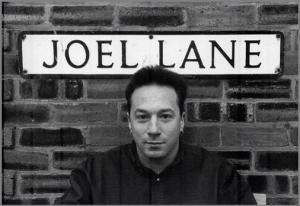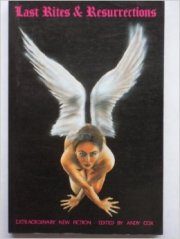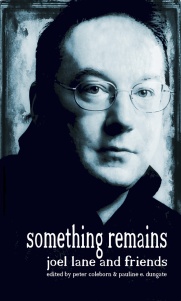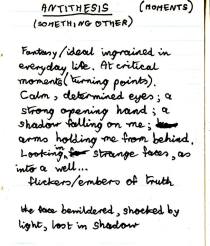 Just a few weeks ago I was exchanging emails with Joel Lane about an anthology he was co-editing, Horror Uncut. I congratulated him on his World Fantasy Award for his collection Where Furnaces Burn, thrilled to see him receiving such well-deserved recognition. I asked after his mother, who had broken her hip, and told him that I had enjoyed meeting her at Fantasycon 2012.
Just a few weeks ago I was exchanging emails with Joel Lane about an anthology he was co-editing, Horror Uncut. I congratulated him on his World Fantasy Award for his collection Where Furnaces Burn, thrilled to see him receiving such well-deserved recognition. I asked after his mother, who had broken her hip, and told him that I had enjoyed meeting her at Fantasycon 2012.
And meanwhile, I was planning to nick the copy of The Witness Are Gone that my friend had received in his freebie bag at the World Fantasy Convention.
Then the postings started to appear on Facebook: Joel died in his sleep on the night of 25 November 2013 at the age of 50. This was a shock, though I was aware he faced some health issues. Two weeks later, I am still stunned. Social media has been awash with grief and an outpouring of memories and love. It helped to be able to share these feelings in such an immediate way, with scattered friends and acquaintances and even people I hadn’t met.
I only started to get to know Joel in the past few years, though I had been reading his fiction well before then. Around 1996 I picked up a book called Last Rites and Resurrections: “Sixteen stories of loss and hope, beauty and terror, drawn from the award-winning magazine The Third Alternative.” Joel had a story there, along with writers like Nicholas Royle, Julie Travis, Neil Williamson and Chris Kenworthy.
Last week I retrieved my copy of Last Rites and Resurrections and revisited his story, “Take Me When You Go”. A nameless narrator recounts a youthful friendship and obsession with boy called Jason, bound by a fascination for flight and magic. The story explores the relationship between the two boys and the passage of time as their lives take very different directions. The protagonist visits the once-charismatic Jason years later, who is now suffering from depression.
Jason had returned to his parents’ home to Walsall, where he feels confined but incapable of going anywhere else. On a walk though a run-down park Jason points out a ‘fibrous mist’ on the horizon… a crowd of starved faces pressing against it, trying to break free. The narrator refuses to acknowledge seeing it, though see it he does. Later, a form of this vision follows him home to Manchester.
This story shows the merging of social realism and strangeness that I enjoyed in Joel’s later work; a mapping of family estrangement, loneliness and longing. It is full of telling details like a ‘green-skinned’ lake in the park, a grey stone Victorian comprehensive school where pupils anticipate beatings from the police or the National Front and worry about survival in the hyper-competitive Thatcherite world. His narrator observes: “There’s always a link between deprivation and fantasy.”
I was hooked. I subscribed to The Third Alternative, the forerunner of Black Static. TTA’s current of “extraordinary fiction” was just what I wanted to read at a time when I was still finding my own voice, bumbling and bumping against the boundaries of fantasy, science fiction and realism. Discovering this kind of fiction was like hearing punk for the first time – it was a revelation, a homecoming. This was what I loved to read and what I wanted to write.
Call it ‘slipstream’, ‘miserableism’ – or ‘horror’ or ‘weird fiction’ as Joel did. (Andrew Hook’s tribute points out that Joel was never keen on the term ‘slipstream’) Others describe it as a spare and starker form of British magical realism. In any case… I loved it in all its downbeat glory. I was also aware that that only two of the sixteen contributors to Last Rites and Resurrections were women, but later I came across Lynda Rucker, Charlee Jacob, Justina Robson and others in the pages of TTA.
This kind of writing was often dark and melancholic, yet suffused with the numinous. It revealed strangeness within the most ordinary settings and events, and found gritty, familiar surfaces and textures within the weird. When a new issue of TTA arrived I turned to any stories by Joel. I appreciated their strong sense of place, their rootedness in Birmingham and the Midands.
I had friendly chats with Joel every so often at cons and launches. But it was when I had him as an editor in Never Again: Weird Fiction Against Racism and Fascism that I began to regard him as a friend and co-conspirator. Never Again was an anthology that Joel co-edited with Allyson Byrd, with proceeds going to the Sophie Lancaster Foundation and Amnesty International. Allyson had mentioned the anthology on Facebook and I contacted her about my story “Survivor’s Guilt”, which had been published in Black Static. Though I rather cheekily invited myself on board, both editors extended a warm welcome.
Through Never Again I met writers who I’ve also come to consider friends – if mostly online – including Mat Joiner, Nina Allan, Alison Littlewood, Simon Kurt Unsworth, Simon Bestwick and of course, Allyson and Joel. Allyson later wrote on a Facebook thread about Never Again: “I’m so happy we all became friends. That book meant so much to us all.”
Never Again brought writers together in a common cause and created lasting associations. But that is only one example of how Joel shared his time and talents with other writers. Mat Joiner and Adrian Middleton describe Joel’s generous support for other writers in Birmingham and his contribution to creative communities in his city. Mat and I both benefited from Joel’s feedback on a collaboration published in Rustblind and Silverbright. His perceptive critique helped us make “The Turning Track” into the story we wanted it to be.
As an editor Joel was both sharp-eyed and sympathetic – I was very impressed that he spotted a misplaced umlaut in “räterepublik” that even my German friend missed. Our collaboration on Never Again highlighted our mutual interest in political activism and social transformation, which became a major theme in our convention conversations. We talked about struggles against cuts and austerity, which were heating up in 2010. We often ended up talking about the tension between political engagement and our need for solitude and time to write. Very often high-faluting discussions of ‘art and revolution’ come down to: should I stay in and work on this story with a deadline or do I go to this action, this meeting, this demo?
At times I’ve wondered if I should have been concentrating more on writing the stories. Or whether I might have published my first book long before 2013 if I hadn’t spent so much time and energy in meetings, writing leaflets and pamphlets or running about (rather slowly) at actions or demonstrations.
My conversations with Joel put these doubts in perspective. He believed that creativity doesn’t flourish in isolation, but is fed by engagement and commitment. He also found ways to merge these two worlds, as exemplified in Never Again and Horror Uncut, the austerity-themed anthology that he was co-editing with Tom Johnstone just before his death.
In her blog Nina Allan relates an appearance on a panel alongside Joel in a discussion about ghost stories: they were “two Aickmanites against the Jamesians”. This provoked a few chuckles as I recalled a conversation where Joel gave me a rundown on divisions in the weird fiction world – along the lines of left-wing party splits. But here I’ll also stress that Joel was non-sectarian in his own outlook, as open and constructive in his politics as in his writing. Though we came from differing political backgrounds – Joel from the Trottish Socialist Party, mine is anarchist/autonomist/libertarian socialist/whatever – the K* word never reared its head!
I last saw Joel in July, at the event that launched Rustblind and Silverbright (which contained a contribution from Joel) and my novella Helen’s Story, along with Nina Allen’s Stardust, Jane by PF Jeffery, Defeated Dogs by Quentin S Crisp. Joel wasn’t very well at the time. Yet he was keen to enjoy the launch of books that involved so many of his friends. We all appreciated his presence, and now the memory of it is especially poignant.
As always, Joel’s actions reflected his belief that the best writing is fostered by community and cooperation. He will be missed, but he will also be celebrated.

*As in Kronstadt. More information from Libcom here and here.
****************
Here are more tributes to Joel and reflections on his work. I’ve already linked to some of these in the text, but I thought it would be good to list them as well. This isn’t comprehensive, so if you have a posting you’d like to add then feel free to contact me about it.
Lynda E Rucker
Simon Bestwick
Nina Allan
Mat Joiner
Gary McMahon
Peter Tennant
Andrew Hook
Jon Oliver
Adrian Middleton
Emma Audsley
Tim Lees
Mark Valentine
Stephen Jones
DF Lewis
Des has also collected his reviews and commentary on Joel’s books here
Thomas Ligotti
Quentin S Crisp
Allen Ashley
John Howard
Peter Coleborn
Mike Chinn
Jeremy Lassen
Martin Sketchley
Michael Kelly
Simon Strantzas
Tindal Street Fiction Group
Tony Richards
Socialist Party
Conrad Williams
Nine Arches Press
 I’m pleased to say that my story “The Pleasure Garden” will appear in Something Remains, a new anthology from Alchemy Press. It will be launched 24 September at Fantasycon by the Sea.
I’m pleased to say that my story “The Pleasure Garden” will appear in Something Remains, a new anthology from Alchemy Press. It will be launched 24 September at Fantasycon by the Sea. ose a sparse and suggestive piece called “Antithesis” – here’s the original on the left. I’ll add that an important facet of Joel’s writing was its dark sense of place and its rootedness in Birmingham. However, contributors were free to place their stories in other locations if they weren’t familiar with Birmingham. For me, this translated to Kennington and Vauxhall in south London. The latter is home to a few well-known gay pubs; it is also the site of a massive surge of corporate construction projects marked by some scary crane-related activity. So out of this melange sprouted “The Pleasure Garden”.
ose a sparse and suggestive piece called “Antithesis” – here’s the original on the left. I’ll add that an important facet of Joel’s writing was its dark sense of place and its rootedness in Birmingham. However, contributors were free to place their stories in other locations if they weren’t familiar with Birmingham. For me, this translated to Kennington and Vauxhall in south London. The latter is home to a few well-known gay pubs; it is also the site of a massive surge of corporate construction projects marked by some scary crane-related activity. So out of this melange sprouted “The Pleasure Garden”.




![helen-s-story-stardust-unsigned-editions-offer--1834-p[ekm]248x300[ekm]](https://rosannerabinowitz.files.wordpress.com/2013/07/helen-s-story-stardust-unsigned-editions-offer-1834-pekm248x300ekm.jpg?w=125&h=151)

